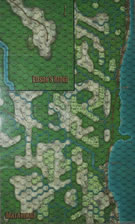|
No Love Lost Jungle Fighting #30 |
||
|---|---|---|
| (Defender) Japan | vs | United States (Attacker) |
| Formations Involved | ||
|---|---|---|
| Japan |  |
2nd "Courageous" Infantry Division |
| United States |  |
182nd Infantry Regiment |
| United States |  |
6th Marine Regiment |

|
| Overall Rating, 1 vote |
|---|
|
5
|
| Scenario Rank: --- of 940 |
| Parent Game | Jungle Fighting |
|---|---|
| Historicity | Historical |
| Date | 1943-01-19 |
| Start Time | 09:00 |
| Turn Count | 27 |
| Visibility | Day |
| Counters | 111 |
| Net Morale | 0 |
| Net Initiative | 3 |
| Maps | 1: Guad-ME |
| Layout Dimensions | 84 x 55 cm 33 x 22 in |
| Play Bounty | 162 |
| AAR Bounty | 171 |
| Total Plays | 1 |
| Total AARs | 1 |
| Battle Types |
|---|
| Delaying Action |
| Rural Assault |
| Conditions |
|---|
| Entrenchments |
| Off-board Artillery |
| Scenario Requirements & Playability | |
|---|---|
| Battle of the Bulge | Counters |
| Guadalcanal | Maps + Counters |
| Jungle Fighting | Base Game |
| Introduction |
|---|
|
After the departure of the battleworn 2nd and 8th Marine Regiments from the 2nd Marine Division, XIVth Corps' Commander, General Patch, attached the 182nd Infantry Regiment (less the 3rd Battalion) and the 147th Infantry Regiment (less the 2nd Battalion and I Company) to the Marine formation to temporarily form what was designated the Combined Army-Marine (CAM) Division on the 16th of January. On the morning of the 19th the two northernmost CAM regiments pushed west. |
| Conclusion |
|---|
|
The Japanese offered light resistance and were driven back almost 1,000 yards. The 182nd Regiment's advance did not keep pace with the 6th Marines and some animosity developed between the two formations with the Marines claiming the advance was delayed a day by the slow movement of the Army unit. |
| Additional Notes |
|---|
|
Elsenborn Ridge or Cassino '44 may be used for the U.S. Army units. This scenario may be played by three players. One player controls the Japanese, one U.S. Army forces, and one the U.S. Marines. |
| Jungle Fighting #30 | ||||||||||||
|---|---|---|---|---|---|---|---|---|---|---|---|---|
After 29 scenarios we finally moved the line back 1000 yards! Or so it seems. This means fresh terrain features to fight over compared to the previous push west scenarios. Additionally, Japanese no longer have morale 9 so they actually have to play PZG instead of Jump at you and poke you with sticks. The interesting bit though, is that this scenario is designed for 3 players, Japan, USMC, and USA. USMC and USA compete for activations and are very difficult to coordinate due to their randomized, semi alternating turns. This prevents them from getting overwhelming force online, and assaults very very tricky to pull off, as you could be exposed for a very long time waiting for your activation to come up. Japan is dug in in their trench line but cant depend on counterattack stacks this time, lacking morale 9, so they plan on spam firing individual units on focused targets to attempt compound dems. Additionally, in front of their trenches which are manned by full strength infantry, they have a screen of reduced infantry that plan on tiring out the Americans a bit before they hit the real line. Still being dug in in the jungle, it is going to take time to root them out even if they dont have much striking power anymore. The central trench has a 3xHMG stack, which hopes to score some dems against advancing Americans, and can sort of fire on both groups. The paird 81s hope to hit those demed units and get some compound step losses, while th rest of the line fires when they can. They really just have to get lucky a few times to hit their kill count, or hold on to a toehold somewhere on the line. Americans focus down the x3 HMG trench with OBA and USA hmg stacks, and get it into essentially stun locked 2 x HMG, while both sides slowly and awkwardly move up. Japan is able to get some dems and followup with the 81s per plan, and get 4 step losses on the marines on approach. This means the marines cant win, and if the Army cant draw, so now they just have to hold on. Marines stagnate in the north firing both of their HMG stacks every turn at a single trench but are unable to produce more than one step loss, while the army in the south advances through their first trench taking 3 losses. This means a Japanese win. Without the coordination problems, the Americans probably win this more often than not, but the limitations make this one interesting and seemingly fairly balanced. |
||||||||||||
| 0 Comments |

 JuFi029
JuFi029 




























